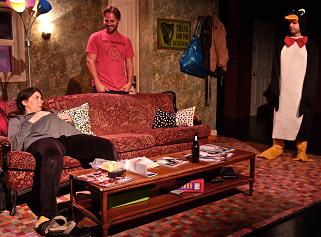
SHORT TAKES
2011 has arrived and, with it, a flurry of activity in the theater. Here’s a sample of some of the plays that have opened in recent weeks.
ME, AS A PENGUIN by Tom Wells
This odd and delightfully quirky play offers the little pleasures that come with discovering a new playwright. His name is Tom Wells. He’s British. And, though the memory of his first play fades with each passing day, I do look forward to seeing what he comes up with next. He has some interesting things to say – and equally interesting ways of saying it – about the contemporary gay culture and, in particular, how it affects a lonely young man who comes to a small English city (to get a taste of gay life) from an even smaller English city where he worked with his mother in a small knitting shop. His encounter with a gay man who – for reasons you might want to discover for yourself – does what he does dressed up as a penguin, manages to arouse in him both lust and despair. It has been neatly staged by John Pleshette and is peopled by a good group of actors who have their accents down, for the most part, but who still seem bent on getting them right, so that, unfortunately, a certain ease and naturalness – with which English actors might have sailed through the play – is missing. It is at the Lost Studio.
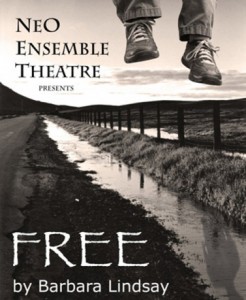 FREE by Barbara Lindsay
FREE by Barbara Lindsay
Don’t know what a floater is? Well, you will certainly find out if you see Barbara Lindsay’s new play. He does what everyone would like to be free enough to do. His body refuses to stay anchored to the earth. He rises. His small-time hustler pal (the marvelous Greg Albanese) sees it as a way to make money by putting him on public display and promising floating lessons. A woman, who longs for her own freedom, wants to discover his secret; her loutish but well-meaning husband loves her and would do anything to please her, but he just doesn’t comprehend 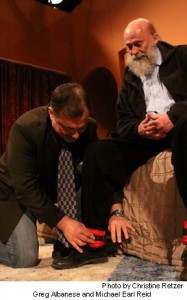 her desire to be free. There is a maid, too, who is quite pragmatic – which makes the floater (who is, after all, imprisoned by his curious gift) gravitate towards her. And she, of course, can’t see him float even when it is clear that he really can float. In plays like this, the metaphors dominate the characterizations, and its ideas can be seen as obvious and simplistic, but, with some straightforward direction by Wendy Worthington, and some neat work by a very capable cast, the play becomes more and more affecting as it moves forward, until finally, if we surrender to its notions, we become dreamers, too. It is a NeO Ensemble Theatre production at [Inside] the Ford.
her desire to be free. There is a maid, too, who is quite pragmatic – which makes the floater (who is, after all, imprisoned by his curious gift) gravitate towards her. And she, of course, can’t see him float even when it is clear that he really can float. In plays like this, the metaphors dominate the characterizations, and its ideas can be seen as obvious and simplistic, but, with some straightforward direction by Wendy Worthington, and some neat work by a very capable cast, the play becomes more and more affecting as it moves forward, until finally, if we surrender to its notions, we become dreamers, too. It is a NeO Ensemble Theatre production at [Inside] the Ford.
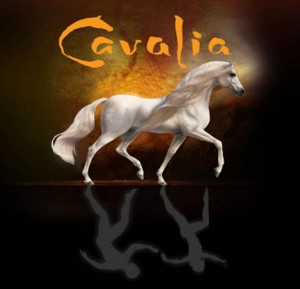 CAVALIA: A MAGICAL ENCOUNTER BETWEEN HORSE AND HUMAN
CAVALIA: A MAGICAL ENCOUNTER BETWEEN HORSE AND HUMAN
Larry King has called this “The best show I have ever seen.” The degree to which you like this spectacle will depend largely on how much you agree with Larry King. When the horses run free, it is as close to poetry as you can get, especially if you have – as this reviewer does – an affinity for horses. But, as spectacle and circus, it is tacky and pretentious in the Nouveau Vegas style. It is at the White Big Top in downtown Burbank.
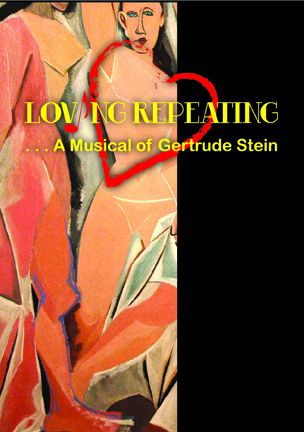 LOVING REPEATING by Stephen Flaherty and Frank Galati, adapted from works by Gertrude Stein
LOVING REPEATING by Stephen Flaherty and Frank Galati, adapted from works by Gertrude Stein
There are writers you fall in love with and writers you develop crushes on. Love may come and go, but some crushes have a way of lasting forever. I shamelessly admit that I have a crush on Gertrude Stein. So, apparently, do composer Stephen Flaherty and his collaborator, Frank Galati. But, unlike Virgil Thompson (with whom Stein wrote the libretti for “The Mother of Us All” and “A Saint in Four Acts”) and Al Carmines (who turned Stein’s “A Circle Play” into the glorious “In Circles”), who understood that abstraction could bring clarity, Flaherty stresses clarity above abstraction. He has taken Stein’s words – which are witty and wise, 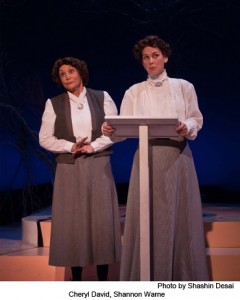 stringent and loose, nutty and sane, and which make their own special music – and, instead of letting them provide the fun, he has tucked them into a nice and tidy little musical about a lesbian love affair between Stein and her equally famous partner, Alice B. Toklas (whose brownie recipe may even have made her more celebrated than Stein is to today’s audiences). It is dainty and refined, rather than rough and ready. It is more like one’s idea of Stein as a creature of rarified taste rather than being true to the genuine toughness of the woman herself, let alone to her art. Every so often, in moments within “As A Wife Has A Cow” and “Miss Furr and Miss Skene,” Stein breaks through in all her deliriously comic glory. But the moments are few and far between. And in this
stringent and loose, nutty and sane, and which make their own special music – and, instead of letting them provide the fun, he has tucked them into a nice and tidy little musical about a lesbian love affair between Stein and her equally famous partner, Alice B. Toklas (whose brownie recipe may even have made her more celebrated than Stein is to today’s audiences). It is dainty and refined, rather than rough and ready. It is more like one’s idea of Stein as a creature of rarified taste rather than being true to the genuine toughness of the woman herself, let alone to her art. Every so often, in moments within “As A Wife Has A Cow” and “Miss Furr and Miss Skene,” Stein breaks through in all her deliriously comic glory. But the moments are few and far between. And in this 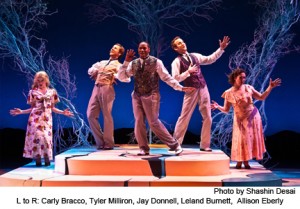 too domesticated production, under caryn desai’s workmanlike direction, the singers are trained and lovely but without real personality, the choreography is happily simple but danced rather stiffly, the sets and costumes are altogether too pretty. If genius, as Stein suggested, means “you have to sit around so much doing nothing, really doing nothing”, then the problem with Loving Repeating is that it does just a little too much and yet not quite enough. It is an International City Theatre production at the Long Beach Performing Arts Center.
too domesticated production, under caryn desai’s workmanlike direction, the singers are trained and lovely but without real personality, the choreography is happily simple but danced rather stiffly, the sets and costumes are altogether too pretty. If genius, as Stein suggested, means “you have to sit around so much doing nothing, really doing nothing”, then the problem with Loving Repeating is that it does just a little too much and yet not quite enough. It is an International City Theatre production at the Long Beach Performing Arts Center.
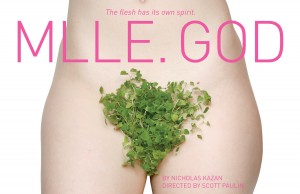 MLLE. GOD by Nicholas Kazan, adapted from the LULU plays by Frank Wedekind
MLLE. GOD by Nicholas Kazan, adapted from the LULU plays by Frank Wedekind
Frank Wedekind’s Lulu plays were so shocking when they were written that they were not produced during the playwright’s lifetime, but they were the source of two of the greatest achievements in the history of twentieth century art: G.W. Pabst’s extraordinary film, Pandora’s Box, and Alban Berg’s unfinished but still monumental atonal opera, Lulu. And anyone who has seen 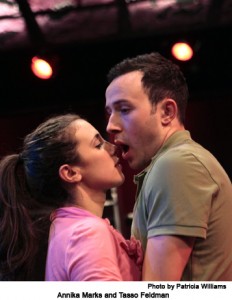 Louise Brooks in the film or Teresa Stratas in the opera will attest to the fact that woman as a primal force was depicted not only as an object of desire but as the embodiment of female sexuality at its rawest and at its most vulnerable and both performances are as indelible as life itself (and both are available on DVD, just waiting to be discovered by the curious and the adventurous amongst you). Lulu is a woman for all seasons, a woman whose boldness is so ripe, it could only be perceived as absolutely natural and, in its way, absolutely innocent. The power of her unabashed and open sexuality is still frightening. And Wedekind must have known it would be suppressed as a play (or as a trio of plays, as it turned out) because he created a character who he knew would have to have her life snuffed out. There is certainly an argument for looking at the plays again and putting a contemporary spin on them. That is exactly what playwright Nicholas Kazan has attempted. And he has failed miserably. Noble intentions are to be praised, but there is simply no excuse for inadequacy.
Louise Brooks in the film or Teresa Stratas in the opera will attest to the fact that woman as a primal force was depicted not only as an object of desire but as the embodiment of female sexuality at its rawest and at its most vulnerable and both performances are as indelible as life itself (and both are available on DVD, just waiting to be discovered by the curious and the adventurous amongst you). Lulu is a woman for all seasons, a woman whose boldness is so ripe, it could only be perceived as absolutely natural and, in its way, absolutely innocent. The power of her unabashed and open sexuality is still frightening. And Wedekind must have known it would be suppressed as a play (or as a trio of plays, as it turned out) because he created a character who he knew would have to have her life snuffed out. There is certainly an argument for looking at the plays again and putting a contemporary spin on them. That is exactly what playwright Nicholas Kazan has attempted. And he has failed miserably. Noble intentions are to be praised, but there is simply no excuse for inadequacy.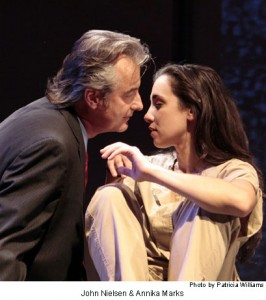 The writing is discursive and fatally dry. He has written two plays, rather than one, and the intermission merely divides the witless comedy of the first play from the deadly tediousness of the second. And the second half of the evening begins with a monologue that is stupefying in its conventionality. And, unfortunately, any version of this work is pointless without a charismatic Lulu. Annika Marks has the spirit but not the guts, and, if depth of character eludes her, the fault lies with the writer and with the director, Scott Paulin, who finds no way to make any of this in the least compelling. (There are two casts, but it honestly doesn’t make a difference.) Get thee to Netflix. It is an Ensemble Studio Theatre/Los Angeles production at the brand new and beautiful theater space, the Atwater Village Theatre.
The writing is discursive and fatally dry. He has written two plays, rather than one, and the intermission merely divides the witless comedy of the first play from the deadly tediousness of the second. And the second half of the evening begins with a monologue that is stupefying in its conventionality. And, unfortunately, any version of this work is pointless without a charismatic Lulu. Annika Marks has the spirit but not the guts, and, if depth of character eludes her, the fault lies with the writer and with the director, Scott Paulin, who finds no way to make any of this in the least compelling. (There are two casts, but it honestly doesn’t make a difference.) Get thee to Netflix. It is an Ensemble Studio Theatre/Los Angeles production at the brand new and beautiful theater space, the Atwater Village Theatre.
harveyperr @ stageandcinema.com
Me, As A Penguin
scheduled to close March 6 at time of publication
for tickets, visit https://www.plays411.net/newsite/show/play_info.asp?show_id=2609
Free
scheduled to close February 27 at time of publication
for tickets, visit http://fordtheatres.org/en/events/details/id/203
Cavalia
scheduled to close in Los Angeles February 15 at time of publication
then plays Vancouver March 22 – April 3, Québec July 27 – August 14, and CAVALIA 2 plays Laval August 17 – September 4
for tickets, visit http://www.cavalia.net
Loving Repeating
scheduled to close February 13 at time of publication
for tickets, visit http://ictlongbeach.org/?p=614
Mlle. God
scheduled to close March 6 at time of publication
for tickets, visit http://www.ensemblestudiotheatrela.org/
ME, AS A PENGUIN by Tom Wells / FREE by Barbara Lindsay / CAVALIA / LOVING REPEATING by Stephen Flaherty and Frank Galati, adapted from works by Gertrude Stein / MLLE. GOD by Nicholas Kazan, adapted from the LULU plays by Frank Wedekind – Los Angeles Theater Reviews
SHORT TAKES
2011 has arrived and, with it, a flurry of activity in the theater. Here’s a sample of some of the plays that have opened in recent weeks.
ME, AS A PENGUIN: This odd and delightfully quirky play offers the little pleasures that come with discovering a new playwright. His name is Tom Wells. He’s British. And, though the memory of his first play fades with each passing day, I do look forward to seeing what he comes up with next. He has some interesting things to say – and equally interesting ways of saying it – about the contemporary gay culture and, in particular, how it affects a lonely young man who comes to a small English city (to get a taste of gay life) from an even smaller English city where he worked with his mother in a small knitting shop. His encounter with a gay man who – for reasons you might want to discover for yourself – does what he does dressed up as a penguin, manages to arouse in him both lust and despair. It has been neatly staged by John Pleshette and is peopled by a good group of actors who have their accents down, for the most part, but who still seem bent on getting them right, so that, unfortunately, a certain ease and naturalness – with which English actors might have sailed through the play – is missing. It is at the Lost Studio.
FREE: Don’t know what a floater is? Well, you will certainly find out if you see Barbara Lindsay’s new play. He does what everyone would like to be free enough to do. His body refuses to stay anchored to the earth. He rises. His small-time hustler pal (the marvelous Greg Albanese) sees it as a way to make money by putting him on public display and promising floating lessons. A woman, who longs for her own freedom, wants to discover his secret; her loutish but well-meaning husband loves her and would do anything to please her, but he just doesn’t comprehend her desire to be free. There is a maid, too, who is quite pragmatic – which makes the floater (who is, after all, imprisoned by his curious gift) gravitate towards her. And she, of course, can’t see him float even when it is clear that he really can float. In plays like this, the metaphors dominate the characterizations, and its ideas can be seen as obvious and simplistic, but, with some straightforward direction by Wendy Worthington, and some neat work by a very capable cast, the play becomes more and more affecting as it moves forward, until finally, if we surrender to its notions, we become dreamers, too. It is a NeO Ensemble Theatre at [Inside] the Ford.
CAVALIA: A MAGICAL ENCOUNTER BETWEEN HORSE AND HUMAN: Larry King has called this “The best show I have ever seen.” The degree to which you like this spectacle will depend largely on how much you agree with Larry King. When the horses run free, it is as close to poetry as you can get, especially if you have – as this reviewer does – an affinity for horses. But, as spectacle and circus, it is tacky and pretentious in the Nouveau Vegas style. It is at the White Big Top in downtown Burbank.
LOVING REPEATING: There are writers you fall in love with and writers you develop crushes on. Love may come and go, but some crushes have a way of lasting forever. I shamelessly admit that I have a crush on Gertrude Stein. So, apparently, do composer Stephen Flaherty and his collaborator, Frank Galati. But, unlike Virgil Thompson (with whom Stein wrote the libretti for “The Mother of Us All” and “A Saint in Four Acts”) and Al Carmines (who turned Stein’s “A Circle Play” into the glorious “In Circles”), who understood that abstraction could bring clarity, Flaherty stresses clarity above abstraction. He has taken Stein’s words – which are witty and wise, stringent and loose, nutty and sane, and which make their own special music – and, instead of letting them provide the fun, he has tucked them into a nice and tidy little musical about a lesbian love affair between Stein and her equally famous partner, Alice B. Toklas (whose brownie recipe may even have made her more celebrated than Stein is to today’s audiences). It is dainty and refined, rather than rough and ready. It is more like one’s idea of Stein as a creature of rarified taste rather than being true to the genuine toughness of the woman herself, let alone to her art. Every so often, in moments within “As A Wife Has A Cow” and “Miss Furr and Miss Skene,” Stein breaks through in all her deliriously comic glory. But the moments are few and far between. And in this too domesticated production, under caryn desai’s workmanlike direction, the singers are trained and lovely but without real personality, the choreography is happily simple but danced rather stiffly, the sets and costumes are altogether too pretty. If genius, as Stein suggested, means “you have to sit around so much doing nothing, really doing nothing”, then the problem with LOVING REPEATING is that it does just a little too much and yet not quite enough. It is an International City Theatre production at the Long Beach Performing Arts Center.
MLLE. GOD: Frank Wedekind’s “Lulu” plays were so shocking when they were written that they were not produced during the playwright’s lifetime, but they were the source of two of the greatest achievements in the history of twentieth century art: G.W. Pabst’s extraordinary film, PANDORA’S BOX, and Alban Berg’s unfinished but still monumental atonal opera, LULU. And anyone who has seen Louise Brooks in the film or Teresa Stratas in the opera will attest to the fact that woman as a primal force was depicted not only as an object of desire but as the embodiment of female sexuality at its rawest and at its most vulnerable and both performances are as indelible as life itself (and both are available on DVD, just waiting to be discovered by the curious and the adventurous amongst you). Lulu is a woman for all seasons, a woman whose boldness is so ripe, it could only be perceived as absolutely natural and, in its way, absolutely innocent. The power of her unabashed and open sexuality is still frightening. And Wedekind must have known it would be suppressed as a play (or as a trio of plays, as it turned out) because he created a character who he knew would have to have her life snuffed out. There is certainly an argument for looking at the plays again and putting a contemporary spin on them. That is exactly what playwright Nicholas Kazan has attempted. And he has failed miserably. Noble intentions are to be praised, but there is simply no excuse for inadequacy. The writing is discursive and fatally dry. He has written two plays, rather than one, and the intermission merely divides the witless comedy of the first play from the deadly tediousness of the second. And the second half of the evening begins with a monologue that is stupefying in its conventionality. And, unfortunately, any version of this work is pointless without a charismatic Lulu. Annika Marks has the spirit but not the guts, and, if depth of character eludes her, the fault lies with the writer and with the director, Scott Paulin, who finds no way to make any of this in the least compelling. (There are two casts, but it honestly doesn’t make a difference.) Get thee to Netflix. It is an Ensemble Studio Theatre/Los Angeles production at the brand new and beautiful theater space, the Atwater Village Theatre.
harveyperr @ stageandcinema.com
photos by
scheduled to close XXXXXXXXXX at time of publication
for tickets, visit XXXXXXXXXXXX
